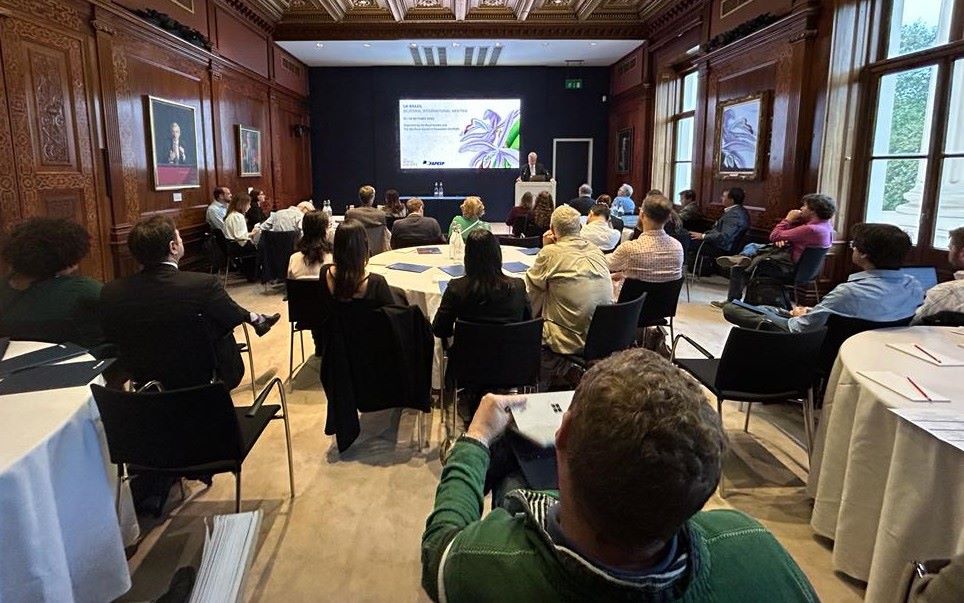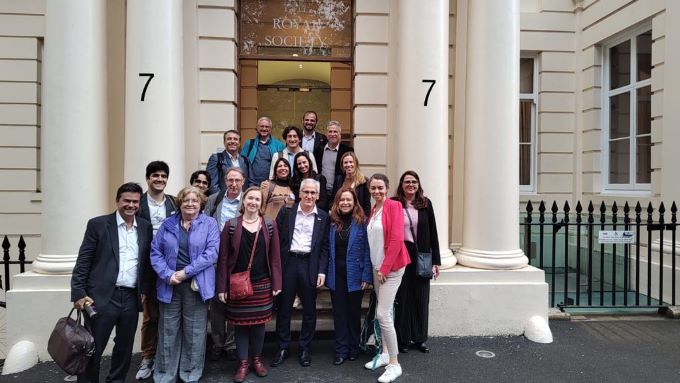


Marcio de Castro Silva Filho, Scientific Director of FAPESP, opened the event.
Published on 01/15/2024
Agência FAPESP – To build ties and foster collaboration between researchers in São Paulo state and the United Kingdom, FAPESP and the Royal Society held a meeting in October in London focusing on two main themes: “Food security and biotechnology in agriculture”, and “Quantum and photonic materials”.
The UK-Brazil Bilateral International Meeting was opened by Professor Marcio de Castro Silva Filho, Scientific Director of FAPESP, and Sir Mark Walport, the Royal Society’s Foreign Secretary and Vice President. The Brazilian participants included 18 researchers from several institutions, such as the Agronomic Institute (IAC), the Brazilian Agricultural Research Corporation (EMBRAPA), the University of São Paulo (USP), the State University of Campinas (UNICAMP), São Paulo State University (UNESP) and the Federal University of São Carlos (UFSCar). The British participants were from York, Warwick, Heriot-Watt, Glasgow, Edinburgh, Nottingham, Strathclyde and Cambridge Universities, Imperial College London, John Innes Center, the Pirbright Institute, the James Hutton Institute, and the National Institute of Agricultural Botany.
The meeting featured presentations on research results, discussion sessions and networking. The topics covered included the effects of temperature changes on the rice transcriptome, the impact of genomics on sustainable intensification of meat production in the tropics, modeling and control of infectious diseases in livestock, laser-induced breakdown spectroscopy (LIBS) applied to agriculture and environmental management, single-photon detection techniques for underwater 3D imaging, secure communications with quantum technology, and quantum brain sensing.
“It was an excellent meeting in every respect. The presentations were first-rate on both sides. The UK representatives emphasized the outstanding quality of the research done in São Paulo,” Castro Silva told Agência FAPESP, adding that the meeting began to bear fruit in November. “We were invited by UKRI [UK Research and Innovation, the national funding agency for science and research in the UK] to negotiate the terms of a new cooperation agreement encompassing the two themes of the event in addition to other areas.”
Besides Castro Silva and the researchers who delivered presentations, the Brazilian delegation included three advisors to FAPESP’s Scientific Director: Niels Olsen Saraiva Câmara, Concepta McManus Pimentel and Meritxell Zurita.

The Brazilian delegation included several awardees of Young Investigator grants from FAPESP.
“When we selected the Brazilian participants, we aimed at a balance not just among research areas but also between men and women. The result was a satisfactorily diverse group,” Zurita said.
“Most of the speakers were very young. Many were awardees of Young Investigator grants from FAPESP,” Câmara said.
Source: https://agencia.fapesp.br/50637